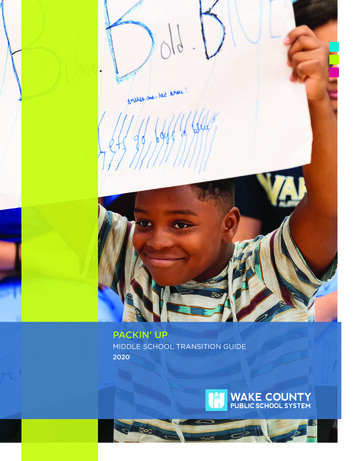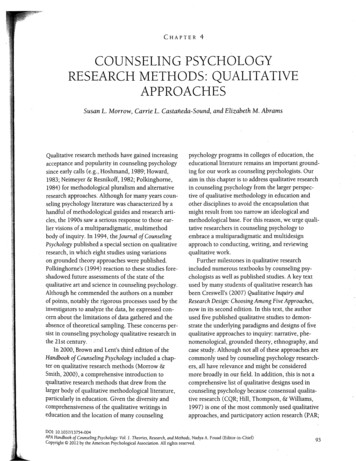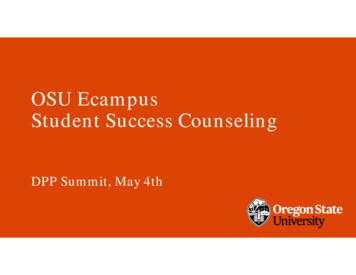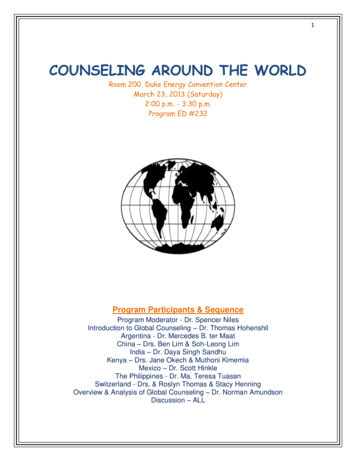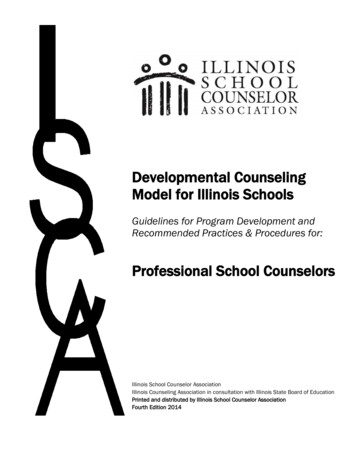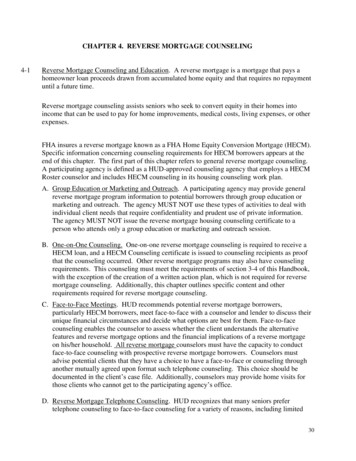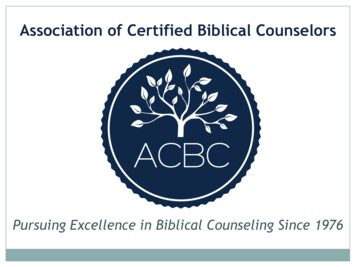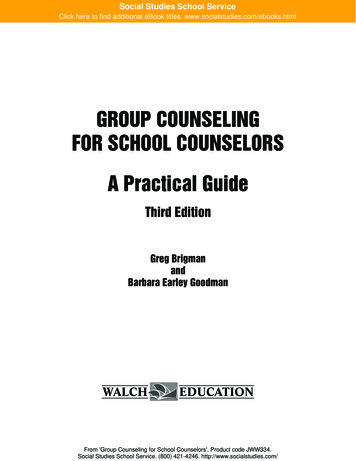
Transcription
Social Studies School ServiceClick here to find additional eBook titles. www.socialstudies.com/ebooks.htmlGroup CounselingFor School CounselorsA Practical GuideThird EditionGreg BrigmanandBarbara Earley GoodmanWALCHEDUCATIONFrom 'Group Counseling for School Counselors'. Product code JWW334.Social Studies School Service. (800) 421-4246. http://www.socialstudies.com/
From GROUP COUNSELING FOR SCHOOL COUNSELORS: A Practical ecord@TF27457The classroom teacher may reproduce materials in this book for classroom use only.The reproduction of any part for an entire school or school system is strictly prohibited.No part of this publication may be transmitted, stored, or recorded in any formwithout written permission from the publisher.1 2 3 4 5 6 7 8 9 10ISBN 978-0-8251-6428-6Copyright 1991, 2001, 2008J. Weston Walch, Publisher40 Walch Drive Portland, ME 04103www.walch.comPrinted in the United States of AmericaFrom 'Group Counseling for School Counselors'. Product code JWW334.Social Studies School Service. (800) 421-4246. http://www.socialstudies.com/
From GROUP COUNSELING FOR SCHOOL COUNSELORS: A Practical ecord@TF27457ContentsAbout the Authors . . . . . . . . . . . . . . . . . . . . . . . . . . . . . . . . . . . . . . . . . . . . . vIntroduction . . . . . . . . . . . . . . . . . . . . . . . . . . . . . . . . . . . . . . . . . . . . . . . . viPart 1: Building the Foundation of Your Group-Counseling ProgramSection 1: Research and Theory Supporting Group Counseling for School CounselorsLinda Webb and Elizabeth Villares . . . . . . . . . . . . . . . . . . . . . . . . . . . . . . . . . . . . . 3Section 2: Eight Keys to a Successful Group-Counseling ProgramLinda Webb . . . . . . . . . . . . . . . . . . . . . . . . . . . . . . . . . . . . . . . . . . . . . . . . . . . . . . . 6Section 3: Getting Started and Strategies for Building SuccessElizabeth Villares . . . . . . . . . . . . . . . . . . . . . . . . . . . . . . . . . . . . . . . . . . . . . . . . . . . 9Section 4: Group Leadership Skills: Keys to SuccessGreg Brigman . . . . . . . . . . . . . . . . . . . . . . . . . . . . . . . . . . . . . . . . . . . . . . . . . . . . . 14Section 5: Reproducible Sample Forms for GroupsBarbara Earley Goodman and Greg Brigman . . . . . . . . . . . . . . . . . . . . . . . . . . . . 19Part 2: Delivering Your Group-Counseling ProgramHigh School Group PlansSection 6: Academic and Social Support: Student Success SkillsGreg Brigman . . . . . . . . . . . . . . . . . . . . . . . . . . . . . . . . . . . . . . . . . . . . . . . . . . . . . 31Section 7: Refusal SkillsJohn P. Huerta . . . . . . . . . . . . . . . . . . . . . . . . . . . . . . . . . . . . . . . . . . . . . . . . . . . . . 43Section 8: Anger Management: Taking ControlAnya F. Koszas . . . . . . . . . . . . . . . . . . . . . . . . . . . . . . . . . . . . . . . . . . . . . . . . . . . . 54Section 9: Loss/BereavementDoreen Cammarata . . . . . . . . . . . . . . . . . . . . . . . . . . . . . . . . . . . . . . . . . . . . . . . . . 74Section 10: Divorce/Changing FamiliesMary Mills . . . . . . . . . . . . . . . . . . . . . . . . . . . . . . . . . . . . . . . . . . . . . . . . . . . . . . 84Section 11: Pregnancy EducationMaryanne Brannigan Grimes . . . . . . . . . . . . . . . . . . . . . . . . . . . . . . . . . . . . . . . . 96Section 12: Transition: The Buddy SystemGayle Kelley . . . . . . . . . . . . . . . . . . . . . . . . . . . . . . . . . . . . . . . . . . . . . . . . . . . . 108Middle School Group PlansSection 13: Academic and Social Support: Student Success SkillsGreg Brigman and Barbara Earley Goodman . . . . . . . . . . . . . . . . . . . . . . . . . . . 125Section 14: Coping with Stress and AngerWes Hawkins and Greg Brigman . . . . . . . . . . . . . . . . . . . . . . . . . . . . . . . . . . . . 151From 'Group Counseling for School Counselors'. Product code JWW334.Social Studies School Service. (800) 421-4246. http://www.socialstudies.com/
From GROUP COUNSELING FOR SCHOOL COUNSELORS: A Practical ecord@TF27457Section 15: Loss/BereavementBarbara Earley Goodman and Greg Brigman . . . . . . . . . . . . . . . . . . . . . . . . . . . 166Section 16: Divorce/Changing FamiliesBarbara Earley Goodman . . . . . . . . . . . . . . . . . . . . . . . . . . . . . . . . . . . . . . . . . . 175Section 17: Handling ConflictsGreg Brigman . . . . . . . . . . . . . . . . . . . . . . . . . . . . . . . . . . . . . . . . . . . . . . . . . . . 195Elementary School Group PlansSection 18: Academic and Social Support: Student Success SkillsGreg Brigman . . . . . . . . . . . . . . . . . . . . . . . . . . . . . . . . . . . . . . . . . . . . . . . . . . .Sectoin 19: Building Math ConfidenceChari Campbell . . . . . . . . . . . . . . . . . . . . . . . . . . . . . . . . . . . . . . . . . . . . . . . . .Section 20: Social Problem Solving, K–2Donna Steinberg . . . . . . . . . . . . . . . . . . . . . . . . . . . . . . . . . . . . . . . . . . . . . . . . .Section 21: Social Problem Solving, 3–5Donna Steinberg . . . . . . . . . . . . . . . . . . . . . . . . . . . . . . . . . . . . . . . . . . . . . . . . .Section 22: Social and Academic Skills Through StorytellingLori Bednarek . . . . . . . . . . . . . . . . . . . . . . . . . . . . . . . . . . . . . . . . . . . . . . . . . . .Section 23: Loss/BereavementMichelle Goldberg . . . . . . . . . . . . . . . . . . . . . . . . . . . . . . . . . . . . . . . . . . . . . . .Section 24: Divorce/Changing FamiliesMichelle Goldberg . . . . . . . . . . . . . . . . . . . . . . . . . . . . . . . . . . . . . . . . . . . . . . .215233247261274291300Group Plans for All LevelsSection 25: New Student ProgramsGreg Brigman and Barbara Earley Goodman . . . . . . . . . . . . . . . . . . . . . . . . . . . 311References . . . . . . . . . . . . . . . . . . . . . . . . . . . . . . . . . . . . . . . . . . . . . . . . . 319From 'Group Counseling for School Counselors'. Product code JWW334.Social Studies School Service. (800) 421-4246. http://www.socialstudies.com/
From GROUP COUNSELING FOR SCHOOL COUNSELORS: A Practical ecord@TF27457Part 1Building the Foundation ofYour Group-Counseling ProgramFrom 'Group Counseling for School Counselors'. Product code JWW334.Social Studies School Service. (800) 421-4246. http://www.socialstudies.com/
From GROUP COUNSELING FOR SCHOOL COUNSELORS: A Practical ecord@TF27457Counselor Guide PagePart 1: Building the Foundation of Your Group-Counseling ProgramSection 1Research and Theory Supporting GroupCounseling for School CounselorsLinda Webb and Elizabeth VillaresResearch Supporting Effective Groupswith Children and Adolescentsand found overall consensus regarding the effectiveness ofgroup counseling in schools.Group counseling in schools is a unique experience inwhich students can express ideas and feelings, gain insightabout themselves and others, and learn and practice newbehaviors that can help them be more successful academicallyand socially.A recent series of studies evaluating the effectiveness ofthe Student Success Skills (SSS) intervention adds to thisbody of group counseling research (Brigman and Campbell2003; Brigman, Webb, and Campbell 2007; Campbell andBrigman 2005; Webb, Brigman, and Campbell 2005). Ineach SSS study, students were introduced to academic, social,and self-management skills through classroom lessons. Theselessons were followed by eight small-group sessions in whichstudents continued to practice and apply these skills to reallife situations, while learning to monitor progress towardacademic and social goals. Students who participated in theSSS groups consistently outperformed comparison studentson standardized measures of math, reading, and behavior.The SSS research contributes to the group work literature,providing evidence of the effectiveness of school counselorsin facilitating group experiences that improve academic andsocial outcomes for students.The American School Counselor Association (ASCA2002) supports group work as an efficient and effectiveapproach to meeting the needs of students that shouldbe included as an integral part of a comprehensive schoolcounseling program aimed at meeting the academic, socialemotional, and career needs of students.The Council for the Accreditation of Counseling andRelated Educational Programs (CACREP 2001) identifiesgroup work as one of eight common core areas essentialfor counselors. Groups allow counselors to help morestudents. Without a solid group-counseling program, schoolcounselors quickly become overwhelmed with individualcounseling needs. School counselors are interested inproviding the most effective and efficient services to helpstudents. Therefore, groups are a must for schools.A strong research base becomes particularly importantin light of the need for school counselors to establishthemselves as essential contributors to improved academicand social outcomes for students (Green and Keys 2001;House and Hayes 2002; Issacs 2003; Lapan 2001; Myrick2003; Paisley and Hayes 2003). Guidelines established bythe National Panel for Evidence Based School Counseling(Carey, Dimmitt, Hatch, Lapan, Lee, and Whiston 2005)at the Center for School Counseling Outcome Research,along with guidelines established by the U.S. Department ofEducation (2003), can help educators and practicing schoolcounselors evaluate the quality of research being used tosupport a particular program’s effectiveness.There are many other compelling reasons for schoolcounselors to provide a solid group-counseling program,including a strong research base—it works. Several extensivereviews of research have shown group counseling withchildren and adolescents to be an effective intervention.Prout and Prout (1998) reviewed 17 school-based studiesof group counseling and found a strong positive impact forstudents on a wide range of measures. Hoag and Burlingame(1997) reviewed 56 outcome studies and also found groupcounseling to have a strong positive impact on childrenand adolescents. Borders and Drury (1992) reviewed 30years of research on the effectiveness of school counselorinterventions on achievement, behavior, and attitudes. Groupcounseling was found to have a positive effect in all threeareas. Two other large reviews, one reviewing 150 studies andthe other reviewing 33 studies, found that group counselingwith children and adolescents was effective and equal to,or better than, individual counseling (Weisz, Weiss, Han,Granger, and Morton 1995; Prout and DeMartino 1986). Inaddition, Shechtman (2002) reviewed group work in schools, 2008 Walch EducationOther Reasons for Group WorkIn addition to the research base, there are othercompelling reasons to include group work as part of abalanced school-counseling program. Group work is a naturalmedium for learning and support. Humans are social beingswho live and work in groups. Groups provide a microcosmof a student’s world in which students can practice newbehaviors that are more constructive and adaptive. Thedevelopment of a caring, supportive group of peers can3Group Counseling for School Counselors: A Practical GuideFrom 'Group Counseling for School Counselors'. Product code JWW334.Social Studies School Service. (800) 421-4246. http://www.socialstudies.com/
From GROUP COUNSELING FOR SCHOOL COUNSELORS: A Practical ecord@TF27457Part 1: Building the Foundation of Your Group-Counseling ProgramHelping students become effective and efficient learnersand social problem solvers is one of the main goals of thesmall-group interventions in this manual. Students whobuild skills in the areas of academic and social competence,which includes cognitive, social, and self-managementskills, experience higher levels of self-efficacy, confidence,and effort and success. The result of these connections ispervasive and leads to improved performance both in and outof the classroom. This holistic approach teaches students thatbehaviors outside the classroom and in nonacademic areasalso have a direct impact on their performance. Students whodevelop these skills come to school mentally and emotionallyprepared to deal with the academic rigors of their education,and begin to experience learning with a newfound joy andhealthy optimism.allow students to take risks with new behaviors and ideas.Role models for positive behavior and attitudes can also beprovided through group work. Modeling is one of the mosteffective learning tools. Groups provide multiple models. Ina group, there is more access to insights, confirmation, andcorrective messages than in individual counseling. There aremany reasons that make sense and support group work inschools, including evidence that it works.Theoretical Basis for Group Counselingwith Children and AdolescentsPositive Psychology rests on the premise of identifyingand nurturing an individual’s strengths and virtues (Seligmanand Csikszentmihalyi 2000). Group counseling providesan excellent vehicle to encourage members to identify anddiscuss specific goals, and explore how their strengths canhelp them obtain successful outcomes. Specific strengths,such as courage, optimism, hope, perseverance, empathy, andgoal setting, are linked to reduced mental illness (Seligmanand Csikszentmihalyi 2000), improved well-being, andincreases in academic and behavioral performance (Webb,Brigman, and Campbell 2005). The authors view individualsas active participants and capable decision-makers, who areinfluenced and affected by their social settings. The followingtheories presented in this chapter—Social Learning Theory,Cognitive Behavioral Theory, and Reality and SolutionFocused Therapy—were chosen for their effective applicationto small group counseling, as well as their strength-basedstrategies and techniques. These theories combine with thePositive Psychology perspective to form a theoretical basis forthe small-group-counseling plans found in Part 2.Cognitive-behavioral therapy examines the thoughtsthat influence an individual’s behaviors and emotions. Whenchildren and adolescents think of themselves as capable ofsuccess, they are more likely to take positive risks and choosebehaviors that will ensure a successful outcome. Groupcounseling allows students to engage in communicationwith peers to identify distorted or unrealistic thoughts, andpractice reframing skills to improve positive, healthy self-talkthat reflects belief in their ability. The language of healthy,optimistic self-talk enables students to view challenges as away to improve their skills, rather than associate their successor failure with a lack of ability. Part of healthy optimismis learning not to doubt your ability, but changing yourstrategies if what you are doing is not working (Seligman1995). This type of cognitive reframing allows students toexamine their behaviors through a lens that builds their selfefficacy and healthy optimism.Social Learning Theory (Bandura 1977, 1993)emphasizes the principle of self-efficacy. Self-efficacy is anindividual’s belief in his or her ability to successfully learna new skill or complete a task. Evidence suggests, “theperson with higher self-efficacy for a particular task willexert more energy, persist longer at the task, and acquiremore knowledge and skills related to the task comparedwith someone with lower baseline self-efficacy” (Harris,Thoresen, and Lopez 2007, 4). In the group sessions thatfollow, individuals are encouraged to believe in their abilities,visualize their successes, and learn from past challenges and/or successes. Children and adolescents benefit from watchingpeers and adults master similar experiences. Identifying timeswhen an individual has overcome challenges opens the doorfor new solutions and problem solving. Skills introduced toa group, followed by demonstrations, practice, and coaching,give a group member the opportunity to learn throughpersonalized and shared experiences with peers. Using atell-show-do-coach approach encourages members to worktogether, acquire new skills and knowledge, identify sourcesof support (parents, teachers, and peers), and resources(school and community). 2008 Walch EducationCounselor Guide PageGroup counseling gives students the opportunity toexperience success and try new strategies when what theyhave been doing has not worked. When faced with a difficulttask, students are encouraged to focus their energy on findinga more effective strategy instead of repeating ineffectivestrategies and automatic negative self-talk messagesthat cause them to doubt themselves. By using cognitivereframing techniques, setbacks are viewed as temporary thatcan be overcome with a different strategy. Processing theseevents in a group teaches students to stay optimistic anddifferentiate between their ability and strategy.Reality/control theory, founded by William Glasser(1969), emphasizes the connection between thinking andbehavior. The theory states that individuals engage inbehaviors to gain a sense of control in order to fulfill their“psychological needs of belonging, power or achievement,fun or enjoyment, and freedom or independence as wellas one physiological need of survival or self-preservation”(Wubbolding 2000, 1). At the core of this theory is thecentral belief that our responses or behaviors are chosen, andtherefore can be replaced with a better choice. For example,4Group Counseling for School Counselors: A Practical GuideFrom 'Group Counseling for School Counselors'. Product code JWW334.Social Studies School Service. (800) 421-4246. http://www.socialstudies.com/
From GROUP COUNSELING FOR SCHOOL COUNSELORS: A Practical ecord@TF27457Counselor Guide PagePart 1: Building the Foundation of Your Group-Counseling ProgramRationale for Administrators and Teachersa student experiencing academic difficulty in the classroommay choose to engage in attention-seeking behavior toattract more one-on-one time from the teacher. Whilethe amount of attention the student receives increases, thestudent’s need to achieve remains unfulfilled. Students wholearn to replace attention-seeking behaviors with appropriate,responsible action (asking questions, completing homeworkand classroom assignments) feel more empowered andsatisfied. Even the smallest improvement leads to a morepositive self-image and gained confidence in their ability tocontinuously improve despite temporary setbacks.As counselors plan their school-counseling programs,they will want to be prepared to help teachers andadministrators understand the importance of group work. Abrief overview of the research supporting the effectivenessof group work in schools can be shared at a faculty or gradelevel meeting along with theoretical principles that lendthemselves to effective group work.At first, school counselors can plan to work withstudents whose teachers understand the importantcontributions counselors can make in improving academicand social outcomes for students. These teachers are morelikely to consistently support group attendance and to followup with skills or strategies learned in group. Perhaps mostimportant, is sharing evidence of improved outcomes forstudents who have participated in group sessions with otherteachers and administrators. This combination of educatingteachers and administrators, working with teachers whobelieve in what you do, and sharing improved outcomesfor students creates a strong case for making sure schoolcounselors have the time to implement balanced schoolcounseling programs, including sound group-counselinginterventions.Modeling, skill-building, goal-setting and progressmonitoring, self-evaluation, formulating and implementingaction plans, and weekly goal-reporting techniques teachchildren and adolescents not only new strategies, but alsoto assume responsibility for their behavior and learn totake responsible steps to change undesirable behaviors. Forexample, students who make the choice to establish weeklygoals must make decisions on steps necessary to achievetheir goals. When these steps lead to goal achievement, noadditional strategies are required. However, when strategieslead to negative consequences or lack of improvement,students learn not to doubt their ability but simply to choosea new strategy. Reporting their successes and setbacks in agroup allows for other students to recognize the strengthsin the individual, share new strategies, and provideencouragement in learning not to make excuses and takingresponsibility for actions.Solution Focused Therapy (De Shazer 1991) is futureoriented and encourages students to select, apply, andevaluate strategies in order to meet desired goals. Studentsare asked to support their thoughts about a specific problemwith evidence and look for times when the problem did notexist. Having students picture what their lives would look,feel, and sound like when their problem does not exist opensthe door to new possibilities. When students can imagine achange to their current problem and visualize success, theyare more likely to stay committed to resolving the problem.Goals are rarely achieved in one step. Instead, successfulgoal achievement requires patience, persistence, and multiplestrategies. When sharing strategies in a group, studentslearn from one another how to avoid mistakes, brainstormsolutions, and encourage one another to meet desired goals.Applying skills to academic, social/personal, and career areasleads to increase performance and healthy attitudes. Studentswho experience success view future opportunities with anoptimistic perspective. They learn to use the language ofsuccess and look for even the smallest improvements.While other theories are represented in the group plansthat follow in Part 2, these four theories briefly describedabove provide a conceptual foundation and a consistentframework. We have consistently found that studentsrespond well to these approaches. 2008 Walch Education5Group Counseling for School Counselors: A Practical GuideFrom 'Group Counseling for School Counselors'. Product code JWW334.Social Studies School Service. (800) 421-4246. http://www.socialstudies.com/
From GROUP COUNSELING FOR SCHOOL COUNSELORS: A Practical ecord@TF27457Part 1: Building the Foundation of Your Group-Counseling ProgramSection 2Eight Keys to a SuccessfulGroup-Counseling ProgramLinda Webb1. T ie group topics to most frequentpresenting problems/mission of school.The encouraging news from these research reviewsis that the skills students need to succeed academicallyand socially—and the model for teaching them theseskills—are clear. The teaching model is based on Bandura’ssocial learning model and involves a “tell, show, do, coach”approach. The group plans in this book follow this model,and many of the plans mirror the most critical skills found inthese research reviews.Most school counselors offer groups on topics thatrepresent the most frequent presenting problems or needs ofchildren and adolescents. Group topics in schools also reflectthe mission of the school: to help students learn the academicand social skills needed for success in living, working, andlearning. The most common types of groups offered byexperienced school counselors include groups that focus on: 2. S how how your groups make adifference.social skillslearning skillsself-control/anger managementdivorcelossschool adjustment/transitionThe current educational climate, along with increasedaccountability demands, makes it increasingly importantfor school counselors to demonstrate how their work affectsstudents’ achievement and behavior outcomes. The No ChildLeft Behind Act (U.S. Department of Education 2001)requires that all students show academic gains as measuredby state mandated tests. As a result of this current focus, itcan become increasingly difficult for school counselors toconvince administrators and teachers that students shouldbe pulled out of valuable classroom time for participationin a counseling group. Therefore, we offer several strategiesthat will help school counselors set themselves up for successduring the planning, implementation, and outcome phasesof the intervention. Each is aimed at showing how studentshave improved as a result of the time they have spent withthe school counselor.The first three of these topics are in line with acomprehensive review of research by Masten and Coatsworth(1998). They reviewed twenty-five years of research ondeveloping competence and on successful and resilientchildren and adolescents, and found three groups of skillsthat separated successful students from those who were not:cognitive/learning, social, and self-regulation skills.Another extensive review of research, covering fiftyyears, by Wang, Haertel, and Walberg (1994), focusedon what helps students learn. They found similar skillareas, especially cognitive/learning skills and social skills,to be the most associated with school success. Groupcounseling involving these three skill areas are a must for anycomprehensive school-counseling program.3. U se the ASCA National Model as a guide.The ASCA National Model (ASCA 2005) provides aframework for the development of a comprehensive, balancedschool-counseling program. The model’s delivery systemrecommends the use of group activities and small groupcounseling aimed at academic, personal/social, and careerdomains. The model is based on the National Standards forSchool Counseling Programs (Campbell and Dahir 1997)which identifies knowledge, attitudes, and skills studentsshould have as a result of participating in school-counselingprogram interventions or activities. The group plans in thisbook reflect the national standards and are designed to meetacademic and personal/social needs of students.Shechtman (2002) reports that approximately 92%of groups conducted with children in schools fall into twocategories of group work. The first category includes guidance/psychoeducational group work, such as developing socialskills, learning skills, and self-management skills. The secondcategory includes group counseling for interpersonal problemsolving, such as divorce, loss, or school adjustment. Thesetopics represent areas of high need in most schools. Thiscombination of group work is an effective way for schoolcounselors, school social workers, school psychologists, andrelated professionals to help students develop the skills andattitudes needed to be successful in school. 2008 Walch Education6Group Counseling for School Counselors: A Practical GuideFrom 'Group Counseling for School Counselors'. Product code JWW334.Social Studies School Service. (800) 421-4246. http://www.socialstudies.com/
From GROUP COUNSELING FOR SCHOOL COUNSELORS: A Practical ecord@TF27457Counselor Guide PagePart 1: Building the Foundation of Your Group-Counseling Program4. S eek leadership opportunities, andtie to the vision and mission of yourschool.6. P lan to show how students are differentas a result of your intervention.It is no longer enough for school counselors to talkabout how many students they saw, how many groups theyran, or how many hours they spent delivering direct servicesto students. Today’s counselors are being strongly encouragedto plan ahead of time how they will show how studentshave improved as a result of the counselor intervention.This also makes it much easier to pull students from classto attend group-counseling sessions. Existing data such asgrades, test scores, attendance, discipline records, drop-outrates, and work completion can be examined pre- and postintervention to show results. Other sources of data such assurveys, teacher observation, and student self-reports canalso be helpful. Counselors can share outcomes with keystakeholders and school-improvement teams.Seek opportunities to work on school improvement andschool-wide planning teams. This is where many decisionsare made and plans for school-wide improvement arestructured. School-improvement teams are usually madeup of teachers, administrators, parents, and members of thecommunity. In many cases, there are also student members.Involvement allows school counselors to become involvedin the identification of school-wide needs and puts themin a position to explain how interventions they are trainedto deliver are related to the school’s vision and mission, andare directly tied to student’s needs. As school-wide plans arewritten, school-counselor interventions can be written intothose plans. For example, if the identified need is improvingstandardized test scores for students in grade six, the schoolimprovement plan might include systematic delivery of theStudent Success Skills intervention at that grade level for thefollowing year. This could be introduced by briefly sharingthe research that shows when students improve learning,social, and self-management skills, and they practice thoseskills throughout the year, they are more likely to learnwhat is being taught and are more successful academically.This kind of involvement is an opportunity for the schoolcounselor to present as a team player, and as part of the largereducational community targeting student success. StudentSuccess Skills plans are included for each level (elementary,middle school, and high school) in Part 2.7. P lan your time (annually, monthly,weekly).Annual plans are critical for looking at the big pictureand should reflect the developmental needs of studentsas outlined in the ASCA National Model (ASCA 2005)and needs assessments conducted at the school. Considerincl
counselors to provide a solid group-counseling program, including a strong research base—it works. Several extensive reviews of research have shown group counseling with children and adolescents to be an effective intervention. Prout and Prout (1998) reviewed 17 school-based studies of group c
